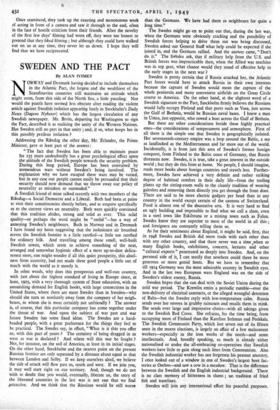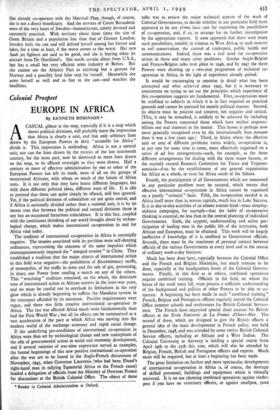SWEDEN AND THE PACT
By ALAN IVIMEY
NORWAY and Denmark having decided to include themselves in the Atlantic Pact, the largest and the wealthiest of the Scandinavian countries still maintains an attitude which might seem, from this side of the North Sea, a little puzzling. Nor would the puzzle have seemed less obscure after reading the violent article against Swedish isolation appearing lately in Stockholm's Daily News (Dagens Nyheter) which has the largest circulation of any Swedish newspaper. Mr. Bevin, departing for Washington to sign the Pact, described it as realising the unity of the Western Nations. Has Sweden still no part in that unity; and, if so, what keeps her in this possibly perilous isolation ?
Addressing the Riksdag the other day, Mr. Erlander, the Prime Minister, gave at least part of the answer : " The fact that Sweden has been able to maintain peace for 135 years undoubtedly has a great psychological effect upon the attitude of the Swedish people towards the security problem. During this long period, Europe has been convulsed by tremendous wars without Sweden's being involved. The explanation why we have escaped these wars may be varied, but in any case our people cannot easily be persuaded that their security should now demand that we throw away our policy of neutrality as mistaken or outmoded."
A Swedish friend of mine talked recently with two members of the Riksdag—a Social Democrat and a Liberal. Both had been at pains to visit their constituencies shortly before, and to enquire specifically as to the current views on neutrality. Both were quickly convinced that this tradition abides, strong and solid as ever. This solid quality—or perhaps the word might be " stolid "—has a way of annoying Sweden's neighbours. Both in Norway and in Denmark I have found my hosts suggesting that the isolationist air breathed across the Swedish frontier is a little rarefied—a little too rarefied for ordinary folk. And travelling among those small, well-built Swedish towns, which seem to achieve something of the neat, arranged and somewhat hygienic effect of a most up-to-date delica- tessen store, one might wonder if all this quiet prosperity, this aloof- ness from austerity, had not made these good people a little out of touch with the world as it mostly is.
In other words, why does this prosperous and well-run country, with just about the highest standard of living in Europe since, at least, 1925, with a very thorough system of State education, .with an astonishing demand for English books, with large connections in the United States, where there are more Swedes than in Sweden—why should she turn so resolutely away from the company of her neigh- bours, to whom she is most certainly not unfriendly ? The answer is, of course, that this particular company has come together under the threat of war. And upon the subject of war past and war future Sweden has some fixed ideas. The Swedes are a hard- headed people, with a great preference for the things they feel to be practical. The Swedes say, in effect, " What is it that you offer us, with this pact of yours ? The certainty of being dragged in as soon as war is declared ? And where will this war be fought ? Not, for instance, on the soil of America, at least in its initial stages. On the other hand, Stockholm and the nearest point on the present Russian frontier are only separated by a distance about equal to that between London and Selby. If we keep ourselves aloof, we believe the tide of attack will flow past us, south and west. If we join you, it may well start right on our territory. And, though we do not wish to doubt that you would, eventually, liberate us, the story of the liberated countries in the last war is not one that we find Attractive. And we think that the Russians would be still worse than the Germans. We have had them as neighbours for quite a long time."
The Swedes might go on to point out that, during the last war, when the Germans were obviously cracking and the possibility of Swedish forces helping to drive them out was being discussed, Sweden asked our General Staff what help could be expected if she joined in, and the Germans rallied. And the answer came, "Don't do it." The Wedes ask, that if military help from the U.S. and British forces was impracticable then, when the Allied war machine was in top gear, what chance would they stand of effective help in the early stages in the next war ?
Sweden is pretty certain that if Russia attacked her, the Atlantic Pact forces would have to attack Russia in their own interests because the capture of Sweden would mean the capture of the whole peninsula and many convenient airfields on the Great Circle course to America. On the other hand, at the slightest word of a Swedish signature to the Pact, Stockholm firmly believes the Russians would fully occupy Finland and that ports such as Vasa, just across the Gulf of Bothnia, would be Russian naval bases. I know a man in Umea, just opposite, who rowed a boat across the Gulf of Bothnia.
But there are other considerations beside these highly practical ones—the considerations of temperament and atmosphere. First of all there is the simple one that Sweden is geographically isolated.
Her seventeenth-century empire was a loop around the Baltic, a sea as landlocked as the Mediterranean and far more out of the world.
Incidentally, it is from just this area of Sweden's former foreign conquest, from Finland to the Baltic coast of Germany, that Russia threatens now. Swedes, it is true, take a great interest in the outside world ; but they do this from at home. No people, I should imagine, reads more books about foreign countries and travels less. Further- more, Swedes have achieved a very definite and rather striking degree of habitual comfort in their daily life—from the trailing plants up the sitting-room walls to the cleanly tradition of wearing galoshes and removing them directly you get through the front door.
There are said to be more electric gadgets per head than in any country in the world except certain of the cantons of Switzerland. Food is almost one of the decorative arts. It is very hard to find an ugly building and impossible to find what we call a slum, even in a steel town like Eskilstuna or a mining town such as Falun. Swedes know they are superior to most of the world in all this ; and foreigners are constantly telling them so.
As for their sentiments about England, it might be said, first, that in 1948 Swedes and British did more trade with each other than with any other country, and that there never was a time when so many English books, exhibitions, concerts, lectures and other "cultural exports " penetrated so deeply into Sweden. And, on the personal side of it, I can testify that nowhere could there be more generous or more genial hosts. But we have to remember that till 1914 Germany was the most admirable country in Swedish eyes. And in the last two European wars England was on the side of Sweden's oldest enemy, Russia.
Sweden hopes that she can deal with the Soviet Union during the cold war period. The Kremlin emits a periodic rumble—over the non-delivery of electrical contracts, or the alleged wrongful detention of Baits—but the Swedes reply with low-temperature calm. Russia sends over her envoys in grubby raincoats and recalls them in mink.
She sends over large and impressive choirs—with all takings given to the Swedish Red Cross. She refrains, for the time being, from occupying more of Finland than the Karelian Isthmus and Porkkala. The Swedish Communist Party, which lost seven out of its fifteen seats in the recent elections, is largely an affair of a few malcontent workers—especially in the iron works of the north—and some intellectuals. And, broadly speaking, so much is already either nationalised or under the all-embracing co-operatives that Swedish workers have little to gain along such lines from Communism. Also the Swedish industrial worker has not forgotten his peasant ancestry.
I once looked out of a window in one of Sweden's largest boot fac- tories at Orebro—and saw a cow in a meadow. That is the difference between the Swedish and the English industrial background. There is no class memory of bitterness in slums ; no tradition of fried fish and tramlines.
Sweden will join any international effort for peaceful purposes. She already co-operates with the Marshall Plan, though, of course, she is not a direct beneficiary. And the services of Count Bernadotte were of the very heart of Sweden—humanitarian, calmly devoted and extremely practical. With territory about three times the size of Great Britain and a population less than that of Greater London, Sweden feels she can and will defend herself among her forests and lakes, for a time at least, if the worst comes to the worst. Her new Saab jet fighters are said to be good, and she is buying other jet aircraft from De Havilland's. She needs certain alloys from U.S.A., but has a small but very efficient arms industry at Bofors. But she cannot see the Atlantic Pact as anything but a gesture for Norway and a possibly fatal false step for herself. Meanwhile she arms herself as well and as fast as she can—and watches the headlines.







































 Previous page
Previous page